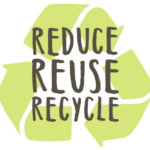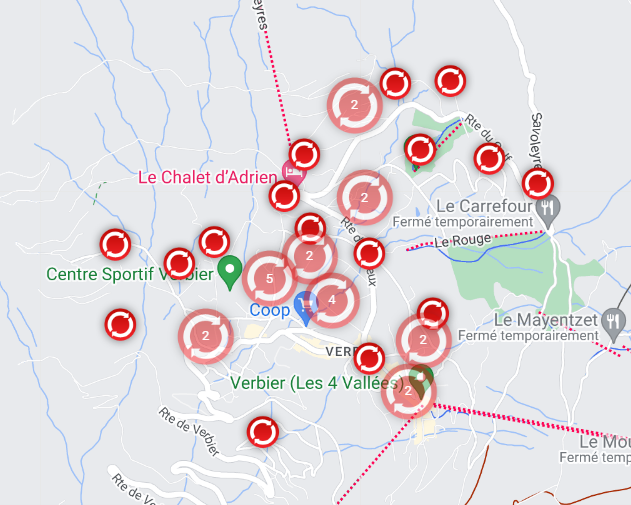You’ll have noticed that one of the most special parts of being at the Verbier Festival is the nature.
How can we all help to make sure that future generations can enjoy it as much as us?
This simple guide gives a few practical ideas. Got more?
Don’t hesitate to share them with samuel.goldscheider@verbierfestival.com
INDEX
- did you know ?
- being green isn’t all sacrificies and restrictions
- every action, no matter how big or small, helps you and the planet
- what’s local?
- a little less meat and dairy?
- what’s in-season?
- the tap-water is drinkable
- what can we recycle?
- walking – one step at a time…
- green workshop…
- feast at the free green breakfast
being green isn’t all sacrificies and restrictions
Many of us fear that being ‘greener’ just means we have to give up many of the things that give us joy.
The opposite is true! Caring for the planet and reconnecting with nature are hugely enriching. They open the door to the reality that we’re a part of something much bigger than us. Discovering these truths may just be the ‘opportunity’ that the climate crisis offers us.
But how can we make things easier as we navigate the path to consuming less and caring more?
be patient with yourself – stressing out about this just means we are more likely to keep consuming to make us happy.
make small changes – as the saying goes, “Habits die hard.” We don’t need to go 100% vegetarian or never fly again in order to make a difference. Small steps help us to head in the direction we want to go.
it’s in our nature – many of us have a habit of thinking we’re separate to nature. Realising that we’re a part of it can be hugely empowering. Connecting with the alps in Verbier can be a portal to feeling your true strength!
every action, no matter how big or small, helps you and the planet
reduce means using fewer resources. It takes a lot of resources to transport everything we buy to Verbier, so when shopping, ask yourself if you really need what you are going to buy?
reuse means making use of what is already available, rather than buying/making something new. A good way of putting this into place in Verbier is sharing with others – perhaps someone can lend you the thing you’re about to buy?
recycle means throwing away things responsibly. See below for what and where you can recycle in Verbier.
what’s local?
The Val de Bagnes (of which Verbier is a part) is famous for apricots, cheese and wine! There’s even a 24h cheese vending machine in the village…
The Verbier tourist office website lists lots of local shops. Buying products directly from producers can be cheaper than the supermarkets. Look out for smaller shops as you walk around town.
(Tourism office, Rue de Médran 41, 1936 Verbier, Phone : +41 27 775 25 86)
There are a couple of local bakeries: Michellod and Pâtisserie de la Poste.
Supermarché Brunet is a small supermarket that’s been around since 1963 and focuses on local products, as does Pam, which is a supermarket based only in the Canton of Valais. Migros, Denner and Co-op are big supermarket chains.
a little less meat and dairy?
The key word is less… you don’t just have to go vegan or vegetarian to make a big difference!
The journal Science published a study which looked at 40,000 farms in 119 countries and covered 40 food products that represent 90% of all that is eaten, concluding: Avoiding meat and dairy products is the single biggest way to reduce your environmental impact on the planet.
what’s in-season?
Eating fruits and vegetables that are ‘in-season’ (meaning that they can be harvested and eaten now) is said to reduce up to 10 times your impact on the climate. Why?
Eating fruits and vegetables ‘out of season’ means they’ve probably:
- been grown in greenhouses that are heated by fossil fuels (think cucumbers and tomatoes in the winter);
- had to be transported from far-away, maybe even by plane, e.g., fresh berries in the winter or spring
- stored for months in warehouses, using chemicals to keep them fresh.
Luckily, summer is the easiest time to do this! What’s ‘in-season’ at the moment in Switzerland? Look out for:
- Apricots
- Aubergine (eggplant)
- Berries (strawberries, raspberries, blackcurrants, blueberries etc.,)
- Broccoli
- CarrotsCherries
- Courgette (zucchini)
- Cucumber
- Melons
- Nectarines, peaches
- Lots of different types of lettuce
- Sweet corn
the tap-water is drinkable
Like most European countries, the tap water is safe to drink.
have you got a reusable water bottle?
Not only will you be reducing plastic, but research shows that plastic bottled water can contain micro-plastics, so carrying round a reusable bottle and drinking tap water is a good idea!
what can we recycle?
We can recycle the following materials in Verbier:
- paper
- plastic bottles (also called “PET bottles”)
- aluminium
- glass
Other things, like coffee pods, detergent bottles, batteries etc., can be recycled at Coop or Migros.
Not sure where the closest place for you to leave these items? Find out here
In order to encourage people to recycle, local authorities decided a few years ago to implement a system which means you have to pay to throw things away. By doing this, they hope people won’t throw away things which can be recycled.
So for things which can’t be recycled, you have buy special bin bags (they are red and white and can be purchased at any of the supermarkets – you just have to ask for it at the cash till).
In order to encourage people to recycle, local authorities decided a few years ago to implement a system which means you have to pay to throw things away. By doing this, they hope people won’t throw away things which can be recycled.
So for things which can’t be recycled, you have buy special bin bags (they are red and white and can be purchased at any of the supermarkets – you just have to ask for it at the cash till).
walking – one step at a time…
For anyone with a car, or taxis organised for you, unless you need to transport something heavy, try to make time to walk – not only does it use less fuel (or electricity), but it’s safer, quieter, a better way to enjoy the views, and, of course… good for you 😊
You can also use these forms of public transport:
- City Bus: timetable Clik here.
- Cable car: timetable Click here
green workshop…
Can a musician have a successful career AND a planet-friendly lifestyle?
What role can those of us in classical music play in raising awareness about climate change?
Are there things we could do better? What good things are already happening?
Join us for these informal workshops (there’ll even be free beer 😊) at the Ecole de la Comba on:
24 July: 20h00-21h30
30 July: 20h00-21h30
feast at the free green breakfast
Did you know that lots of plant-based foods (like nuts, seeds and grains) are full of protein?
Come and enjoy a fun and delicious breakfast at the Ecole de la Comba (where the orchestras rehearse) on:
21 July: 08h30-10h00
31 July: 09h00 to 10h30
Any other ideas ?
Don’t hesitate to share them with samuel.goldscheider@verbierfestival.com


